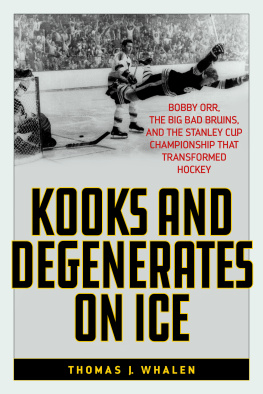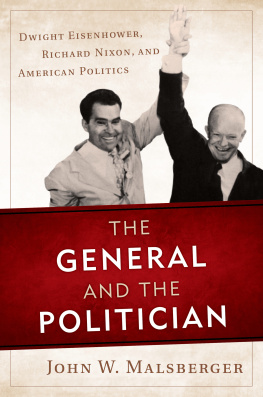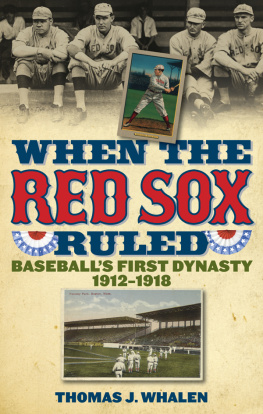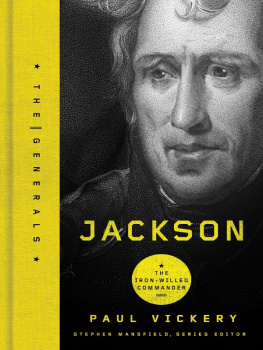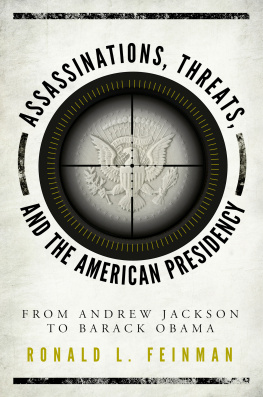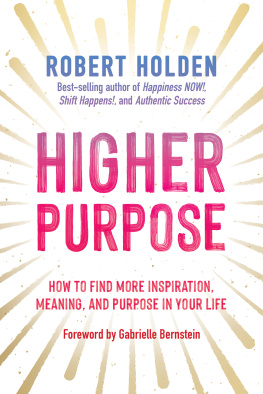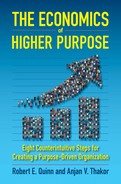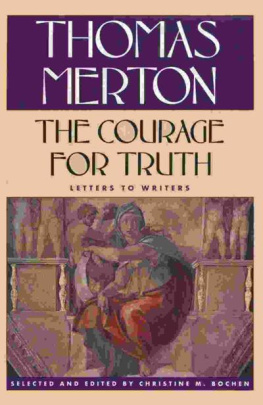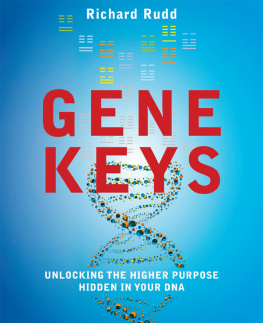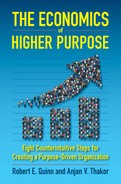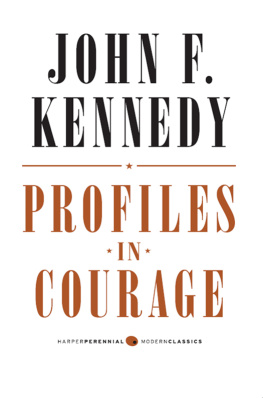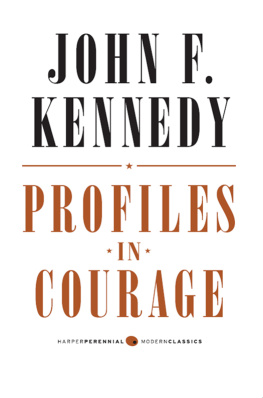A NOTE ON THE AUTHOR
Thomas J. Whalen was born in Salem, Massachusetts, and studied at Bates College and at Boston College, where he received a Ph.D. in history. His writings have appeared in a number of publications, including the Boston Globe, and he is also the author of Kennedy versus Lodge: The 1952 Massachusetts Senate Race and Dynastys End: Bill Russell and the 196869 World Champion Boston Celtics. Mr. Whalen now teaches social science at Boston University and lives in Peabody, Massachusetts.
Acknowledgments
IN WRITING THIS BOOK I have several special people to thank. First and foremost is Joseph D. Spinale, my stepfather who passed away shortly before I completed the manuscript. Joe was as amiable and warmhearted a person as one can find in life. He always had a kind word and a smile to give. I greatly miss him. My mother, Mary Anne Whalen Spinale, is a ball of energy and enthusiasm who has always supported me. She has my everlasting love and gratitude.
Dan Hammond and Christopher Callely once again proved they are true friends in always being there for me and offering thoughtful commentary on my work. Elizabeth Crowley lent me her keen editorial insight and love of history to sharpen my focus. Old coach and history teacher Fred Hammond provided welcome inspiration. So did the Boston College institution, Thomas H. OConnor. Steve Blumenkrantz and Don Clemenzi lent great moral support, as did Joseph King, Mike Feloney, Mary Hammond, Wayne Ferrari, Greg Morose, Robert Gormley, Bob Connors, and Scott Ferrara.
Ivan Dee did a splendid job in getting this book ready for publication. I greatly value his contributions. Among my many supportive friends and colleagues at Boston University, I especially wish to thank Linda Wells, Jay Corrin, Christopher Fahy, Andy Andres, June Grasso, Bill Tichin, Michael Kort, Robert Wexelblatt, Ben Varat, Barbara Storella, Shelly Hawks, Ed Rafferty, Susan Lee, Polly Rizova, Kathleen Martin, John Mackey, Naomi-Lomba-Gomes, John McGrath, Stephanie Kermes, Sally Epstein, Matt Dursin, Diane Payne, and Tracey Nickerson.
Finally, I thank my students, who over the years have kept me intellectually on my toes and appreciative of what a rewarding job I have.
T.J.W.
Peabody, Massachusetts
March 2007
CHAPTER ONE
Slaying a Hydra of Corruption
Andrew Jackson and the Bank War
I t was fast approaching midnight on July 8, 1832, when Martin Van Buren arrived at the White House. The former New York governor turned presidential adviser had been sent for by Andrew Jackson to discuss an issue of utmost urgency, one that threatened to destroy the presidents domestic program of innovative political and economic reform, if not his entire administration.
Congress had just approved the renewal of the charter for the Bank of the United States. Jackson was apprehensive. Over the years the quasi-public bank, under the skilled leadership of its president, Nicholas Biddle, had acquired an inordinate amount of influence in the halls of Congress; many senators and congressmen were said to be working for it rather than for their constituents. The bank had increasingly geared its lending policies to the needs of the very wealthiest in American society and operated with virtually no system of governmental or private oversight. It was a kingdom unto itself. From Jacksons perspective, this hydra of corruption needed to be chopped down to size. Yet to do so with strong executive action placed his presidency at great risk. Biddle and his bank had the money, resources, and political connections to make the banks detractors pay, and in a presidential election year, that could mean defeat at the polls.
Nonetheless if anyone was up to such a challenge, Van Buren believed, it was Jackson. In the course of my public life, he wrote, I have not met with another man who came up to Gen. Jacksons standard as well in respect to the strength of his belief in the certainty that a public servant honestly laboring for the welfare of his Country would receive the good-will and support of the people as long as they remained confident of his integrity as in his constant readiness to stake his political reputation upon that faith regardless of consequences merely personal to himself.
Jackson didnt disappoint him this time either. Taking firm hold of Van Burens hand upon greeting him, the president calmly revealed his plans for Biddle and the BUS: The bank, Mr. Van Buren, is trying to kill me, but I will kill it !
Such indomitable resolve was forged early in Jacksons life. The son of poor Scotch-Irish parents who had immigrated to America in the latter half of the eighteenth century, young Andrew had an arduous upbringing. His father died shortly before he was born on March 15, 1767, leaving his mother, Elizabeth Hutchinson, to raise him and his two older brothers by herself in the Waxhaw region of what is now South Carolina. An indifferent student, Jackson seemed to enjoy practical jokes on his friends and cussing a blue streak more than devoting serious thought to his studies. He also had the unfortunate habit of angering quickly, a trait that would stay with him into adulthood. By G-d, he once warned a group of his peers who saw him collapse from the recoil of a gun blast, if one of you laughs, Ill kill him! He thrived on conflict, noted one of his more discerning biographers, yet even when victorious never allowed himself to feel triumphant. He continually needed to prove himself. In short, he was a violent and unpredictable youngstera most difficult and lively companion.
The American Revolution did not improve Jacksons disposition. A volunteer in the Continental Army at thirteen, he served as a mounted orderly for which I was well fitted, he later said, being a good rider and knowing all the roads. In 1780 he and his brother Robert were taken prisoner by the British after trying to elude a company of enemy dragoons at his cousins home. Ordered by a British officer to clean the mans boots, Jackson impetuously refused, claiming he expected such treatment as a prisoner of war had a right to look for. Enraged at this response, the officer slashed at Jackson with his saber, cutting the boys head and left hand. Marched by foot to a military prison in Camden, South Carolina, Andrew and Robert Jackson suffered through the severest of deprivations, including near starvation.
To make matters worse, the brothers contracted smallpox, the horrific disease that at the time killed millions of people throughout the world. Luckily for Andrew, he was nursed back to health by his mother after he and Robert were released in a prisoner exchange. Robert was less fortunate: his weakened body could not fight the disease, and he expired. Jackson had already lost his brother Hugh, who had collapsed and died from heat exhaustion during the 1779 Battle of Stono Ferry. The loss of Robert left him inconsolable; according to one account, he became a raving maniac. Yet this suffering was but a prelude to an even greater sorrow. In 1781 his revered mother died of cholera, leaving Jackson the only surviving member of his immediate family. I felt utterly alone, he later recalled.
In the wake of this string of losses, Jackson drifted for a time before finally deciding on the law. But his law studies too often took a backseat to his pursuit of personal pleasure. We all knew that he was wild that he gambled some and was by no means a Christian young man, recalled Nancy Jarret, a young female acquaintance from this period. When he was calm he talked slowly and with good selected language. But animated he would talk fast with a very marked North-Irish brogue. Older women were even less approving. Why, when he was here, recalled one dowager, he was such a rake that my husband would not let him in the house. It is true he might have taken him out to the stables to weigh horses for a race, and might drink a glass of whiskey with him there.


